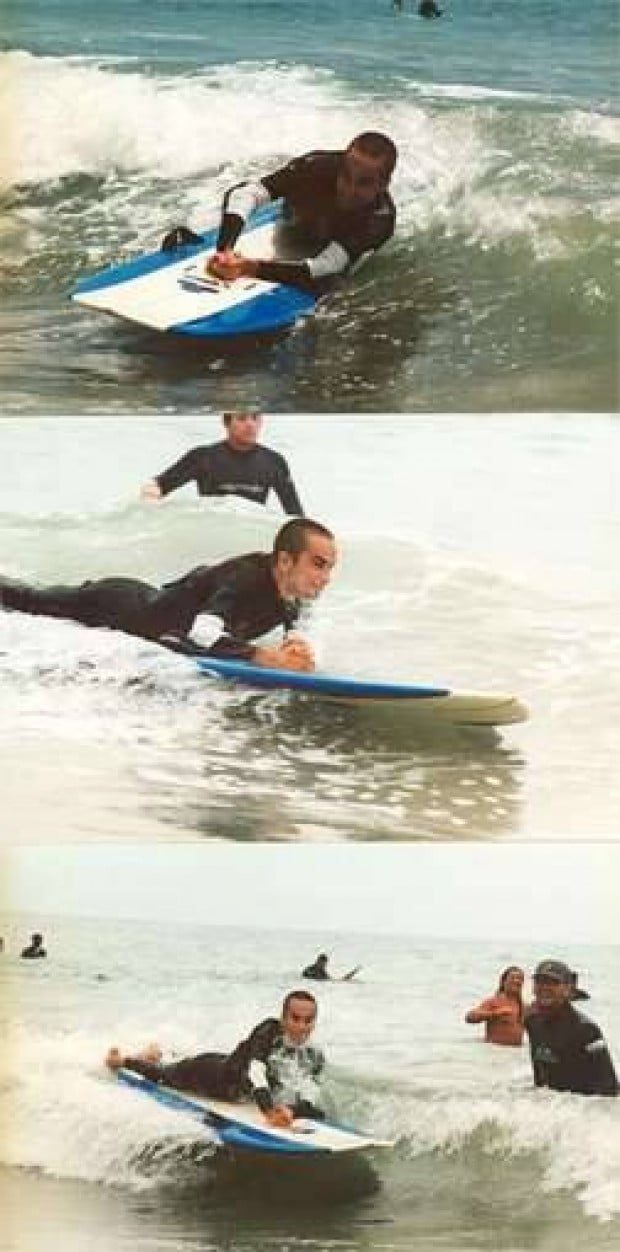Rick Bieber’s vision is to create ongoing strategic alliances among major media companies that have the ability to pass on an important message–how to stay alive.
By Sylvie Belmond/Staff Writer
A 15-year-old high school girl in Tanzania knows the ravages that AIDS can cause.
She sees it daily, feeling doomed and powerless, and expects to get the disease herself because she believes it’s out of her control.
Rick Bieber, a Malibu resident and father of three, is a pragmatic man who likes to move toward ventures with a business-oriented approach.
His flourishing 20-year career as a producer in the entertainment industry has taught him that the media has unparalleled power that can be harnessed and used for the betterment of humanity, one person at a time.
These two people’s dissimilar paths met when Bieber went to Africa this spring to see how Population Services International, a 30-year-old nonprofit organization based in Washington, works. PSI helps improve the health of people worldwide through preventive measures and health education, providing programs in more than 50 countries.
Because of their meeting and the education PSI provides, hope and empowerment may be re-instilled in the young Tanzanian girl’s heart and mind.
“She was just so articulate in describing the pressures and the situation within which she found herself,” said Bieber of the girl.
Bieber has been to Africa before, but this trip was unlike the others.
“My first trips were really taken in connection with my work,” said Bieber. “Most places that you go to will, in some respect, feel similar to where we live and to our experience, but that’s not really true in Africa.”
Kate Roberts, PSI director of public affairs, went on the trip with Bieber.
“Rick was extremely emotional and moved by what he saw over there,” said Roberts.
“We really did go on a guided misery tour,” she said of the trip. “What we saw was tragic. Every other house had somebody with AIDS in it.”
This particular trip was focused on the work being done by PSI program directors. “No assignment was too insignificant and no success too instrumental,” said Bieber, impressed with the organization’s approach.
“In this case, my support of PSI has to do with their practical effectiveness, attempting to stem the tide,” said Bieber about the AIDS epidemic.
These social marketing programs, using the existing infrastructure within those countries to disseminate health care products and information, offer families the ability to improve their health, he explained.
PSI is the largest social marketing organization in the world working to make health products and services available for just pennies to the poor.
“It’s all about prevention,” said Bieber, as he spoke about PSI’s efforts.
Though PSI’s involvement with disease prevention is broad aside from AIDS, Bieber is particularly interested in the new international Youth Aid Campaign undertaken by the organization.
In Africa, where 25 percent of the population is infected with the AIDS virus, Bieber observed that PSI enabled people to make choices that can save their lives. Simple but not always easy choices, like using condoms and knowing how to negotiate with a partner to use one as well, are the most powerful weapons to prevent the transmission of AIDS.
PSI visits schools, brothels, beer halls and many other places in developing countries where people need to hear the message the most. The organization also provides the condoms, but not for free. It charges a minimal fee because people are more likely to use them if they paid for them, said Bieber.
The students Bieber encountered in Africa were bright and forthright, able to describe the pressure and reality of their continuing effort to stay healthy.
These young people are the future of Africa; the problem for them is not to compromise their health or their integrity within the reality of their living situation. They recognize and understand the equation, but it’s hard to change cultural and behavioral patterns that have existed forever.
“It’s extremely difficult,” said Bieber, who traveled to Zimbabwe and Tanzania to grasp a better understanding so he could speak to it. “I really was blown away about how dedicated these people are.”
“The youth in developing countries seemed quite interested in the lifestyles of their counterparts in the United States,” said Bieber, who believes that Hollywood can use the influence it holds with the world’s youth to help YouthAIDS fight the proliferation of the fatal disease.
Bieber now serves as an advisor to the PSI board on strategic alliances, and began the process of introducing the organization to major media companies in an effort to strengthen its efforts.
“I hope that I can reach my friends and colleagues within the entertainment media industries and have them think about ways to help,” he said. “Malibu is heavily populated with people like me in the entertainment business.”
Bieber owns and operates an independent company with interests in film, television, commercials, music video production and new media activities. He served as president and CEO of multiple media companies and co-created a record label and satellite of Atlantic Records. Bieber also produced several well-known feature films and television movies.
“It’s really so easy to identify other ways to make a contribution, but practically, PSI will become an enormously important effort to stem the growth of the virus,” said Bieber.
And there are many ways to help. From staging concerts to benefit premieres and 30-second ads by celebrities, the options are limitless. Bieber also plans to have a fundraiser in Malibu.
But it’s more than just asking for money. It’s creating relationships where there is emotional investment that fosters opportunities for contributors and beneficiaries.
“We approached Rick because we knew the strategies we wanted to have,” said Roberts. “We realized that Rick was extremely well-connected.”
“Our strategy with AIDS awareness fitted with his vision,” continued Roberts. “We are a behavior change organization. We mobilize people to help them to lead a healthier life.”



